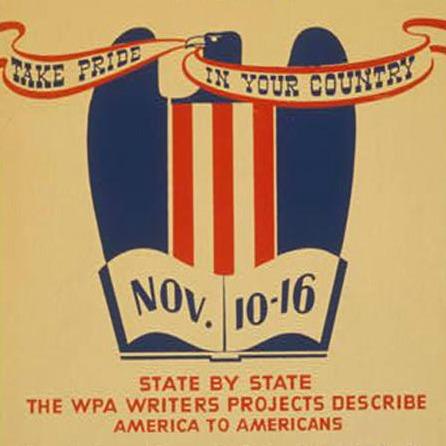BOB GARFIELD: The challenge of giving less-told stories out to Americans who need them and out to America, in general, is the bane of market-driven journalism. Back in 1935, Franklin Roosevelt put thousands of people to work under the aegis of the Federal Writers Project to do just that.
[SINGING UP & UNDER]
Among those stories, the recollections of slaves, later voiced in an HBO documentary.
WOMAN: We’d be playin’ in the barn and Jimmy’d always say to me, “Come on, nigga, let’s ride around the farm.” I’d say, “I ain’t no nigga.” He’d say, “Yes, you is. My pa paid $200 for you. He bought you for to play with me.”
BOB GARFIELD: Back in 2008, I spoke to Jerrold Hirsch, author of Portrait of America: A Cultural History of the Federal Writers' Project. He says that among the writers who collected interviews and information about their own multifarious Americas were Conrad Aiken, Saul Bellow, John Cheever, John Steinbeck –
JERROLD HIRSCH: Ralph Ellison, Richard Wright. The Writers' Project was set up to find a program that would employ not only creative writers, but people who had skills beyond doing infrastructure. There were unemployed librarians, lawyers, teachers and journalists and writers. Most of the people on the project had to come off the relief rolls.
BOB GARFIELD: Now, 6600 people mainly plucked from the relief rolls, to do what?
JERROLD HIRSCH: To rediscover America, to give us a new and broader knowledge of the very country we lived in and not to see it in narrow, exclusive terms of just the dominant culture.
The things they concentrated on were the American Guide Series, a comprehensive and encyclopedic guide to every state in the Union, but they're also well known for the interviews with former slaves, interviews with textile workers in the South, with the idea of the national office called Introducing America to Americans.
BOB GARFIELD: Now, it is conventional wisdom that when the federal bureaucracy gets involved in areas that hitherto had been confined to the free marketplace that everything pretty much goes wrong. It’s hard to imagine that literature would be any exception. How successful was the government [LAUGHS] in getting their work into the hands of ordinary Americans?
JERROLD HIRSCH: They were very successful in getting the Guides into the hands of ordinary Americans because they realized that they were not in the position to really publish books for the public market. And they signed contracts with major publishers of the time, so they were able to get much of that stuff out.
The interviews with slave narratives, the first of those did not come out until Benjamin Botkin edited a collection called Lay My Burden Down. And they were available on microfilm at the Library of Congress but historians didn't get around to using them until the 1960s, when they began to become more interested in the slaves’ perspective.
[CLIP]:
WOMAN: Well, the next day the master calls me and tells me, “Woman, I’s payin’ big money for ya, you are a big portly gal. Rufus is a big portly man. I want y’all to bring forth portly children. I’s put you to live with Rufus for that purpose. Now, if you don’t want a whippin’ at the stake, you do what I want.”
[END CLIP]
BOB GARFIELD: If you were the Federal Writers' Project czar yourself, how would you deploy the writers and researchers and editors and historians at your disposal to produce what is not produced by the free market of literary ideas?
JERROLD HIRSCH: Well, you know, it’s interesting you mention that because at one point the National Endowment for the Humanities under Bill Clinton was headed by William Ferris, who is a folklorist and American studies person. He had in mind grants for regional encyclopedias and state encyclopedias, with much of the same idea of rediscovering the diversity we're often unaware of in America, having a record of the lives of people who often get neglected. So I would say that that would seem to me a worthwhile thing to do.
BOB GARFIELD: You could be describing Studs Terkel’s career.
JERROLD HIRSCH: Right.
BOB GARFIELD: And he’s a veteran of the Federal Writers' Project. [LAUGHS]
JERROLD HIRSCH: Right. But one of the things that the people at the Writers' Project thought in the national office, and they were more liberal, but they thought that if Americans, through the project and on the project, became in touch with the grassroots and everyday life, defining culture in that way, it would lead to a renaissance in American literature and a revival in American arts that could build on that.
[MUSIC UP & UNDER]
BOB GARFIELD: Well Jerry, thank you so much.
JERROLD HIRSCH: Thank you. It’s been a pleasure talking with you.
BOB GARFIELD: Jerrold Hirsch is author of Portrait of America: A Cultural History of the Federal Writers' Project.
